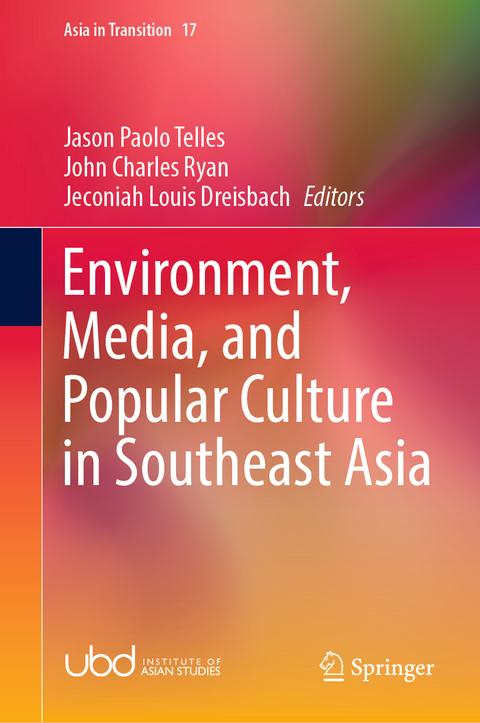
Environment, Media, and Popular Culture in Southeast Asia
Springer Verlag, Singapore
978-981-19-1129-3 (ISBN)
Jason Paolo R. Telles is an Assistant Professor of Broadcast Communication of the University of the Philippines, Baguio. As an ecocritic, he has presented and published his research on Indigenous mediation of eco-cosmovisions, critical animal and media studies, and ecomedia studies in various conferences, books, and academic journals. Apart from that, his other research interests are media anthropology, Indigenous media studies, and media linguistics. He is a member of the Association for the Study of Literature and the Environment – Association of Southeast Asian Nations (ASLE-ASEAN) and the Southeast Asian Media Studies Association. John Charles Ryan is Adjunct Associate Professor at Southern Cross University, Australia, and Adjunct Senior Research Fellow at the Nulungu Institute, Notre Dame University, Australia. His research focuses on Aboriginal Australian literature, Southeast Asian ecocriticism, the environmental humanities, ecopoetics, and critical plant studies.His recent publications include Introduction to the Environmental Humanities (2021, authored with J. Andrew Hubbell), The Mind of Plants: Narratives of Vegetal Intelligence (2021, edited with Monica Gagliano and Patrícia Vieira) and Nationalism in India: Texts and Contexts (2021, edited with Debajyoti Biswas). In late-2021, he was Visiting Professor of Literary Theory and Methodology at Universitas Negeri Yogyakarta, Indonesia. Jeconiah Louis Dreisbach (PhD Candidate, Universitat Oberta de Catalunya) is an Assistant Professorial Lecturer at the Department of Filipino of De La Salle University in Manila, The Philippines. His research interests include the political economy of popular culture, politics of Southeast Asian media, and language and media. His works were also published in the fields of sociolinguistics, public health, and Philippine cultural studies. He is a member of the Southeast Asian Media StudiesAssociation and the Philippine International Studies Organization. He is also an editorial board member of the Malaysian Journal of Media Studies (Universiti Malaya
Chapter 1. Introduction: Ecologies of Southeast Asian Media and Popular Culture (Jason Paolo Telles).- Part 1. Activism, Environment, and Indigeneity.- Chapter 2.Sons of Soil: Reconstituting Bumiputeraism Indigeneity, Tanah Melayu, and Tanah Adat Orang Asli (Yvonne Tan).- Chapter 3. Reading the Novel Sarongge through the Eyes of Female Environmental Activists in Indonesia (Meredian Alam).- Chapter 4. Nguyen Trinh Thi’s Ecocinema: An Artistic Response to Environmental Problems in Vietnam (Tran Ngoc Hieu).- Chapter 5. Vietnamese Cinema and Ecological Issues: The Story of Pao and Black Forest (Lê Thị Dương).- Chapter 6. “Greatest Prodigy of the Vegetable World:” The Mediation of Rafflesia, the Corpse Flower of Southeast Asia (John Charles Ryan).- Part 2. Political Ecologies and Urban Spaces.- Chapter 7. The Nightcrawlers and the Optics of Death: Documenting Duterte’s Necro-Politics (Jose Kervin Calabias).- Chapter 8. Intervening in the Indonesian Election through Ecodocumentary: The Caseof Sexy Killers (Agung Wardana).- Chapter 9. The Village as a Space of Rights: The Political Ecology of Mangroves and Fish Farming in an Island Village in Central Philippines (Eulalio Guieb).- Chapter 10. The West Philippine Sea Dispute and Memefied Fish on Facebook (Jason Paolo Telles).- Chapter 11. Telegraphic Poetics in Anxiety Myths by Afrizal Malna: Re-envisioning Human Interconnection with Material Ambience in the Digital Millennium (Henrikus Joko Yulianto).- Part 3. Narratives, Discourses, and Aesthetics.- Chapter 12. Against DomiNation: Intersectional Aesthetics in U. Raksasad's Fictional Documentary Agrarian Utopia (Natalie Boheler).- Chapter 13. The Littoral Zone as Guerilla Zone: The Hydroaesthetics of Revolutionary Music for Filipino Fisherfolk (Jose Monfred Sy).- Chapter 14. Maps and Shifting Power Relations in the Mekong Delta Region (Tami Banh).- Chapter 15. The Trend of “Movies as Tourism Promotion:” From Picturesque Landscapes to Eco-Consciousness (Hoang Cam Giang).- Chapter 16. The Reporting of Climate-Related News by the National Broadcast Media of Brunei Darussalam (Sharifah Nurulhuda Alkaff).- Chapter 17.Ecocentric Underpinnings in the My Village Children's TV Program in Laos (Jason Paolo Telles).- Part 4. Imperialism, Nationalism, and Islands.- Chapter 18. Singapore, Colonialism, and the Environment (Marcella Polain).- Chapter 19. Archipelagic Choreography: Movement and Intertwining Bodies in Emiliana Kampilan’s Dead Balagtas (Maria Karaan).- Chapter 20. National Properties, National Ecologies: Postcolonial and Ecocritical Engagements with Mikhail Red’s Birdshot (2016) (Trish Remetir).- Chapter 21. Wild Honey: Caring for Bees in a Divided Land (Balthasar Kehi).- Chapter 22. Slow Cinema, Filipino Epistemology, and Nature in Lav Diaz’s From What Is Before (Stefan Torralba).- Chapter 23. Escaping Paradise, Returning this Island: Examining Representations of Siargao and Islandic Space (Leonard Thomas Shaw).
| Erscheinungsdatum | 06.06.2022 |
|---|---|
| Reihe/Serie | Asia in Transition ; 17 |
| Zusatzinfo | 40 Illustrations, color; 5 Illustrations, black and white; X, 348 p. 45 illus., 40 illus. in color. |
| Verlagsort | Singapore |
| Sprache | englisch |
| Maße | 155 x 235 mm |
| Themenwelt | Naturwissenschaften ► Biologie ► Ökologie / Naturschutz |
| Sozialwissenschaften ► Kommunikation / Medien ► Kommunikationswissenschaft | |
| Sozialwissenschaften ► Kommunikation / Medien ► Medienwissenschaft | |
| ISBN-10 | 981-19-1129-0 / 9811911290 |
| ISBN-13 | 978-981-19-1129-3 / 9789811911293 |
| Zustand | Neuware |
| Informationen gemäß Produktsicherheitsverordnung (GPSR) | |
| Haben Sie eine Frage zum Produkt? |
aus dem Bereich


